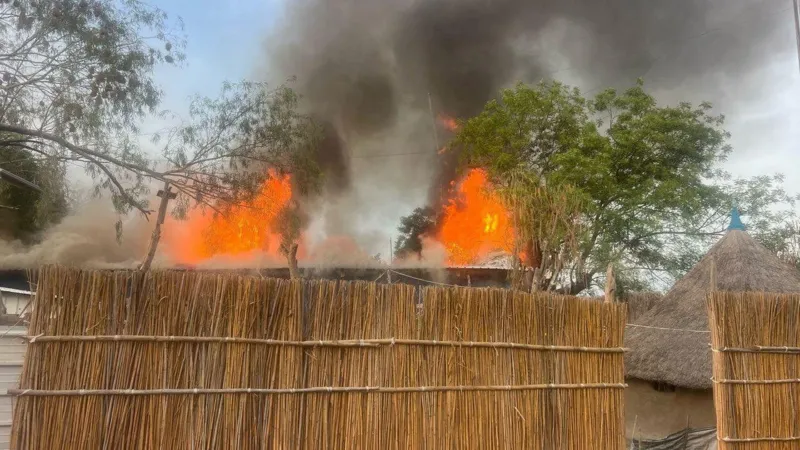At least seven people have been killed following a bombing attack on a hospital and market in South Sudan, raising fears of a return to full-scale civil war in the country. The attack, which occurred in the town of Old Fangak in Jonglei state, has drawn widespread condemnation from humanitarian organizations, with Doctors Without Borders (MSF) calling the bombing a “clear violation of international humanitarian law.”
According to MSF, the attack began when helicopter gunships targeted the hospital it operates in Old Fangak, bombing its pharmacy and causing a fire that completely destroyed it. The helicopters then continued to fire on the town for around 30 minutes. A drone was subsequently deployed, and it bombed a local market, further intensifying the devastation. The hospital in Old Fangak is the only healthcare facility in Fangak county, which serves a population of more than 110,000 people, making its destruction especially catastrophic for the local community.
MSF confirmed that all medical supplies at the hospital were lost in the attack. The charity also reported that at least 20 people were injured, and the bombing has left the local population with even fewer medical resources to rely on during a time of heightened instability.
Mamman Mustapha, a spokesman for MSF, spoke to the BBC’s Newshour program, stating that the organization was still working to verify the facts of the attack. However, he said that local witnesses had identified the aircraft involved in the bombing as “government forces helicopters.” Mustapha emphasized that the hospital was clearly marked with the MSF logo, and its coordinates had been shared with all warring parties in the region to ensure that it was recognized as a neutral and protected medical facility. Despite this, the bombing occurred, and the impact on civilians has been severe.
In response to the bombing, MSF condemned the attack as a violation of international humanitarian law, which prohibits the targeting of medical facilities and civilians during conflict. The charity expressed deep concern for the safety of both local residents and humanitarian workers in the region, highlighting the urgent need for the international community to ensure the protection of medical facilities in conflict zones.
There has been no immediate comment from the South Sudan government regarding the bombing. The BBC has reached out to the foreign affairs ministry for a statement but has yet to receive a response.
The attack comes at a time of increasing concern about the security situation in South Sudan. Nicholas Haysom, the head of the UN mission in South Sudan, has recently warned that the country is “teetering on the brink of a return to full-scale civil war.” These concerns have been exacerbated by a deepening feud between President Salva Kiir and Vice-President Riek Machar, who have long been rivals and whose conflicts have often been framed along ethnic lines. The tensions between the two men have escalated in recent months, contributing to an unstable environment.
Hours before the hospital bombing, South Sudan’s army chief announced punitive strikes on hijacked barges.
Just hours before the hospital bombing, the head of the South Sudanese army, Paul Majok Nang, announced plans for punitive strikes against several barges that had been hijacked on a river. He accused a militia aligned with Vice-President Machar of being behind the attack, although Machar has not yet responded to the claims. Machar himself was arrested in March, along with several of his associates, on accusations of attempting to incite rebellion. The South Sudanese government has also recently designated certain counties as hostile, further fueling suspicions of an impending conflict between the country’s two largest ethnic groups.
South Sudan gained independence from Sudan in 2011, but just two years later, the country descended into a brutal civil war after President Kiir dismissed Machar as vice-president, accusing him of plotting a coup. The war, which largely followed ethnic lines, led to an estimated 400,000 deaths and displaced more than 2.5 million people, or more than a fifth of the country’s population.
A peace agreement was signed in 2018, and a unity government was formed with Kiir and Machar as the leaders. However, the promise of peace has remained elusive. Elections that were supposed to take place since the peace deal were never held, and key provisions of the agreement—such as the disbanding of militias and the formation of a unified national army—have not been fully implemented. Armed groups loyal to various political figures continue to operate in the country.
The recent violence, particularly the clash between the White Army militia (which had supported Machar during the civil war) and the South Sudanese army in Upper Nile state, is one of the many signs that the country remains on the brink of another round of large-scale conflict. Earlier this year, a UN helicopter was shot at while attempting to evacuate soldiers, killing several, including a high-ranking general from the army.Human rights organizations have called on the government to cease the bombing of civilian areas and to protect humanitarian workers and infrastructure. With the situation deteriorating rapidly, the international community’s response will be critical in determining whether South Sudan can avoid slipping back into full-scale civil war.

